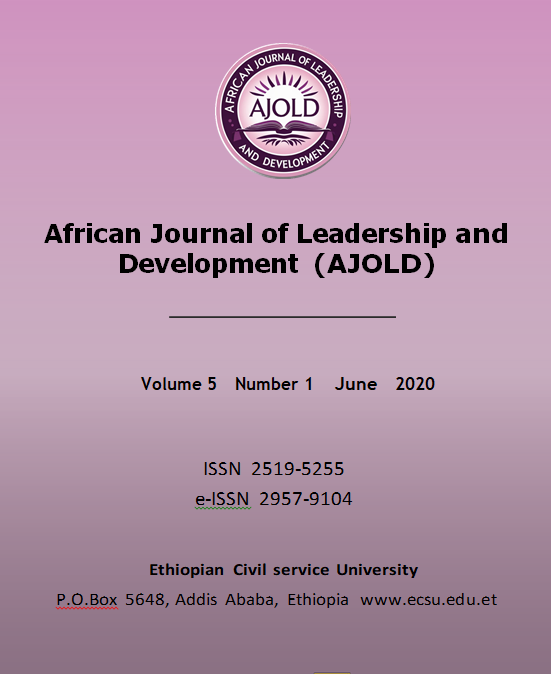Assessment of Practices and Challenges of Knowledge Management in Selected Government Organizations: The Case of Addis Ababa City Administration and Oromia Region
DOI:
https://doi.org/10.63990/2020ajoldvol5iss1pp46-68%20Keywords:
Temesgen Dagne, Yohannes Tamiru, Bonsen AlemuAbstract
This study focuses on assessing the practices and challenges of knowledge management in selected organizations of Addis Ababa City Administration and Oromia Regional State. The main objective of the study was to assess and describe the current KM practices and challenges of A.A City Administration and Oromia Regional State in light of KM cycle, associated concepts, and suggests viable, remedial, and appropriate solutions or measures that can enhance its overall KM systems. With a view to achieving this objective, a descriptive research survey design had been dominantly applied. Moreover, the researchers employed mixed research approach, where qualitative method was made to be embedded within the quantitative method. A total of 315 respondents drawn from five study units, namely PSHRDB, EB, TVTEA, ICTDA, and M/PO were involved and used as a typical data source of the study. The respondents were selected using purposive and random sampling techniques. The data were collected by means of different primary and secondary research instruments, such as questionnaires and group interviews. Data analysis was largely made using descriptive statistics by means of SPSS version 21.0 and Microsoft Excel spreadsheet programs, and the findings were further discussed or interpreted through theory analysis approaches. Of the responses gathered, data collected, and analyzed, it was found that the study organizations have little concern in respect of treating KM as part of their asset base, there is no as such clearly written and communicated administrative procedure so as to guide knowledge capturing in the organizations, the knowledge sharing habit of respondent employees is very poor, the main reasons for the low level of knowledge sharing in the study organizations were lack of support and reward that initiates knowledge sharing, lack of established culture on information exchange, and lack of interest of sharing knowledge among workers (knowledge hoarding behavior of workers). The overall status of knowledge management practices in the study organizations was found to be very low. The study recommended that top managers/leaders should set directions, drive and support knowledge management in every way they can. In addition, a KM framework policy document that would serve as a blue print for knowledge management in the organizations should be developed and implemented. On top of this, employees should be knowledge-oriented, and the organizations should install knowledge management as an inseparable part of their organizational culture.
Downloads
Published
How to Cite
Issue
Section
License
This work is licensed under a Creative Commons Attribution-NonCommercial 4.0 International License






